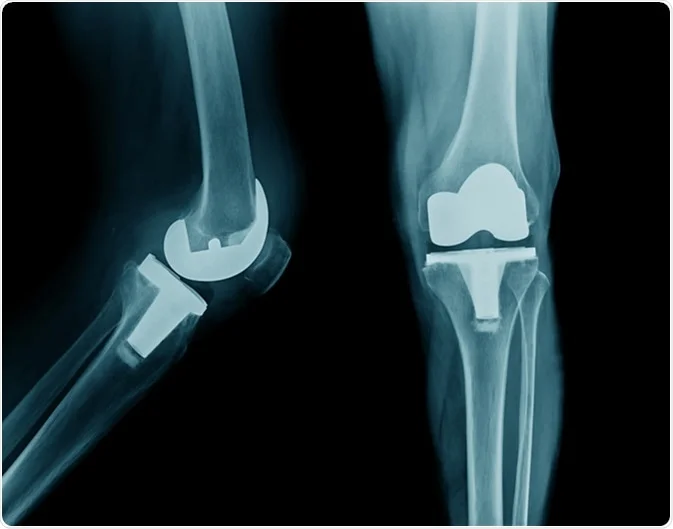Knee Conditions
Total Knee Replacement
A Total Knee Replacement (TKR) or Total Knee Arthroplasty is a surgery that replaces an arthritic knee joint with artificial metal or plastic replacement parts called the ‘prostheses’. The procedure is usually recommended for older patients who suffer from pain and loss of function from arthritis and have failed results from other conservative methods of therapy.

The typical knee replacement replaces the ends of the femur (thigh bone) and tibia (shin bone) with plastic inserted between them and usually the patella (knee cap).
Diagnosis
The diagnosis of osteoarthritis is made on history, a physical examination & X-rays.
There is no blood test to diagnose Osteoarthritis (wear & tear arthritis).
Benefits
The decision to proceed with TKR surgery is a cooperative one between you, your surgeon, family and your local doctor.
The benefits following surgery are relief of symptoms of arthritis. These include
- Severe pain that limits your everyday activities including walking, shopping, visiting friends, getting in and out of chair, gardening, etc.
- Pain waking you at night
- Deformity- either bow leg or knock knees
- Stiffness
Prior to surgery you will usually have tried some conservative treatments such as simple analgesics, weight loss, anti-inflammatory medications, modification of your activities, canes, or physical therapy.
Once these have failed it is time to consider surgery. Most patients who have TKR are between 60 to 80 years, but each patient is assessed individually and patients as young as 20 or as old as 90 are occasionally operated on with good results.
Pre-Operation
- Your surgeon will send you for routine blood tests and any other investigations required prior to your surgery.
- You will be asked to undertake a general medical check-up with a physician.
- You should have any other medical, surgical or dental problems attended to prior to your surgery.
- Make arrangements for help around the house prior to surgery.
- Cease aspirin or anti-inflammatory medications 10 days prior to surgery as they can cause bleeding.
- Cease any naturopathic or herbal medications 10 days before surgery.
- Stop smoking as long as possible prior to surgery.
Day of your surgery
- You will be admitted to the hospital, usually on the day of your surgery.
- Further tests may be required on admission.
- You will meet the nurses and answer some questions for the hospital records.
- You will meet your Anesthetist, who will ask you a few questions.
- You will be given hospital clothes to change into and have a shower prior to surgery.
- The operation site will be shaved and cleaned.
- Approximately 30 minutes prior to surgery, you will be transferred to the operating room.
Surgical Procedure
Each knee is unique and knee replacements take this into account by having different sizes for your knee. If there is more than the usual amount of bone loss, sometimes extra pieces of metal or bone are added.
Surgery is performed under sterile conditions in the operating room under spinal or general anesthesia. You will be on your back and a tourniquet applied to your upper thigh to reduce blood loss. Surgery takes approximately two hours.
The surgeon cuts down to the bone to expose the bones of the knee joint.
The damaged portions of the femur and tibia are then cut at the appropriate angles using specialized jigs. Trial components are then inserted to check the accuracy of these cuts and determine the thickness of plastic required to place in between these two components. The patella (knee cap) may be replaced depending on a number of factors and depending on the surgeon’s choice.
The real components are then inserted with or without cement and the knee is again checked to make sure things are working properly. The knee is then carefully closed and drains usually inserted, and the knee dressed and bandaged.

